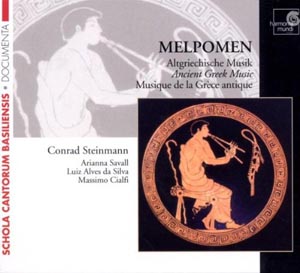 The essay that accompanies this disc is titled “Ancient Greek Music for an Athenian Symposium of around 450 BC.” Think about that for a moment: in the absence of scores, soundtracks, any notated music whatsoever, or any other specific records, how can anyone perform music from classical antiquity?
The essay that accompanies this disc is titled “Ancient Greek Music for an Athenian Symposium of around 450 BC.” Think about that for a moment: in the absence of scores, soundtracks, any notated music whatsoever, or any other specific records, how can anyone perform music from classical antiquity?
Before we answer that question, just a reminder about the importance of music in ancient Greek life: drama and poetry were customarily set to or accompanied by music; symposia, the dinner parties that were the chief private social event among Greek citizens, were provided with musical accompaniment; festivals and processions featured singers, dancers, and musicians; and even the hetairai, the courtesans, at least the higher priced ones, were expected to be accomplished musicians. (Looking at it, in this age of Muzak, MP3 downloads, and I-Pods, not much has changed, really. Except maybe the courtesans.)
This recording is the end result of years of collaborative effort among musicologists, archaeologists, museum curators, and instrument makers. While there are surviving treatises on the music theory of ancient Greece, nothing remains to tell us about what it actually sounded like, so there’s necessarily a lot of empirical work going on here. The result is fascinating.
It’s not really very surprising that this music recalls traditional music of the Balkans so strongly: that’s an old tradition, with deep roots and a lot of modern examples. It goes beyond that, a little — there are hints of old Iberian traditions as well, echoes of something that is perhaps not Greek so much as pan-European, along with a sense of Greece’s long history on the edge of the Levant. The strongest identity, however, is definitely with the traditional music of the Balkans — some of the instrumental pieces could be transported in toto to a “Music of Montenegro” collection with nary a raised eyebrow.
What is surprising is how contemporary so many of these selections sound. It’s lean music, spare, thoughts simply declared and concisely rendered, such as one might find in the music of, perhaps, Ned Rorem or Michael Nyman.
Nor do the subjects of what we can consider ancient Greek “popular” music (popular among the aristocrats, at least) differ so much from those of our own after 2,500 years: love, both in its hope and its despair, and the pleasures of the vine (although I can’t really claim there’s a classical equivalent of “Margaritaville” in this collection).
Conrad Steinmann’s informative (and much too brief) essay is rounded out by discussions of the origins and reconstructions of some of the instruments used in the recording, the whole seductively presented, with texts of the poems in English, French, German and Greek and illustrations largely from ancient Greek vase paintings.
This is amazingly appealing music, a voice out of the far past touching so many places in our contemporary world. It ranges from energetic to ethereal, with a haunting quality of déjà vu that belies the distance of history.
Ensemble Melpomen is Conrad Steinmann, aulos and direction; Arianna Savall, barbiton and soprano; Luiz Alves da Silva, altus and kymbala; Massimo Cialfi, tympanon, krotala and salpinx.
(Harmonia Mundi, 2005)
